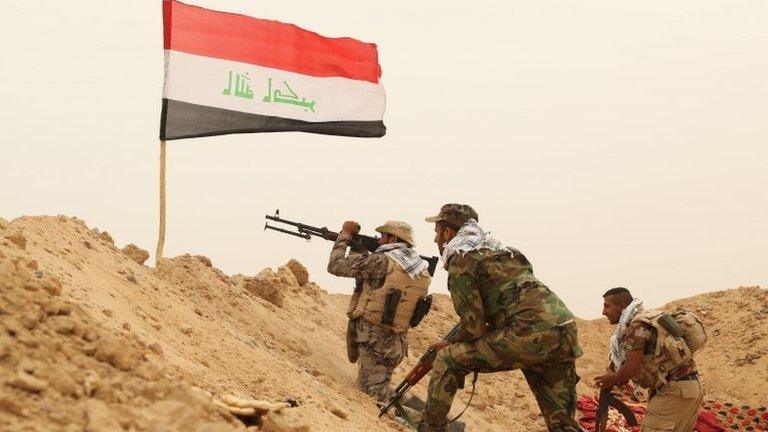No easy way to defeat Islamic State
- Published
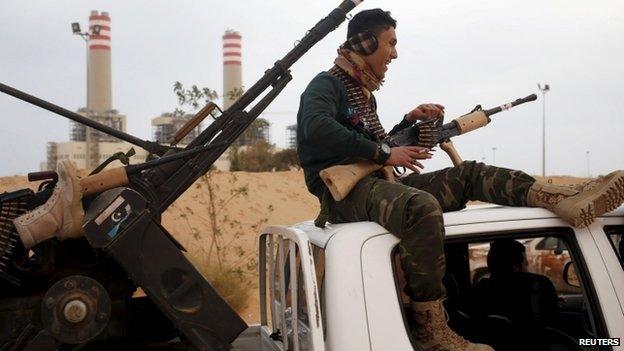
IS has a stronghold around the Libyan town of Sirte
We were warned by Western political leaders that the war against the ultra-extremists of so-called Islamic State (IS) would be a long one. It is becoming increasingly clear their caution was fully justified.
Britain's Foreign Secretary, Philip Hammond, now draws a rather startling parallel with a much larger war, the Second World War, against a far larger fascist organisation, the Nazis.
He reminded an audience in London, external earlier this week that it took almost five years from the British retreat at Dunkirk in 1940 to final Allied victory in Europe and the fall of Berlin in 1945.
His message: Be patient.
So is the present war being won, however slowly?
On the ground, of course, it is being fought overwhelmingly by the people of those countries where IS has seized territory.
Still, the task of degrading its fighting capability so substantially that the IS threat can be radically diminished relies on outside support from key military powers.
The international campaign is being fought on at least two fronts, in Iraq and in Syria, (although Britain is only involved in Iraq).
It is not being fought on another important front, in Libya, where IS has extended its hold around the town of Sirte, exploiting the vulnerability of a non-functioning state which is being dismembered by hundreds of rival militias.
In all three countries, the anti-IS coalition faces huge political obstacles making the struggle even harder.
The Iraq front
At the very least, the current anti-IS strategy is not delivering the sort of results which might be expected from a combination of foreign airpower and efforts to strengthen the Iraqi army.
The continuing reliance of Iraq's Prime Minister, Haider al-Abadi, on Iranian-backed Shia militias to regain lost territory comes at a heavy political price, undermining hopes of national reconciliation efforts.
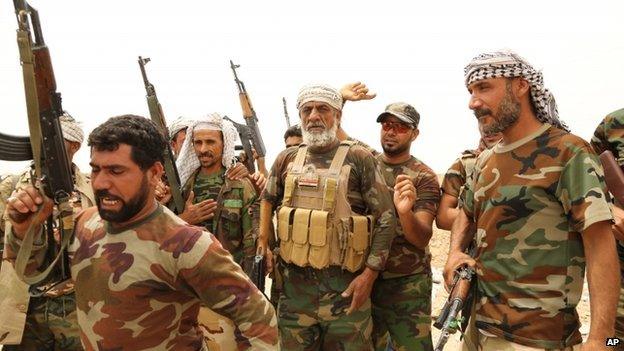
Iraq has relied on Iranian-backed Shia militias to fight IS
Al-Abadi complains, external that it is the international coalition which is not doing enough, failing to give him more arms and ammunition, but Western governments who had lost all faith in his predecessor, Nouri Al-Maliki, now privately question his successor's will to win too.
Reliance on Shia militias is steadily alienating still further the Sunni tribes of Iraq who have to be persuaded that there is a tolerable future for them in a far less sectarian state.
Whatever the condition of the military campaign against IS in Iraq, the wider political struggle to produce a more "inclusive" Iraq, which is sensitive to the substantial Sunni minority as well as the Shia majority, is certainly not being won.
So watch for more Western pressure on the Iraqi government, as well as the deployment of more US military trainers.
Expect also a significant expansion of Britain's military contribution too, at least a doubling of the number of British military trainers.
That would deliver to David Cameron the additional benefit of being seen by Washington as a firmer "first friend".
Britain would be supplying real additional military muscle to counter the dismissive view, external in the Obama administration of "Shrinking Britain".
However much British ministers protest that the charge is unfounded, it is a derogatory phrase taking hold at very senior levels in the US.
The Syria front
The condition of Syria is far more worrying.
There, IS fighters continue to exploit the deadlocked civil war.
They do suffer some reverses, but so far IS can still keep open corridors to the Turkish border.
That allows more radicalised recruits from Europe to reach them and join the ranks.
At its simplest, the political obstacle in Syria remains the extraordinary tenacity of the Assad regime in Damascus.
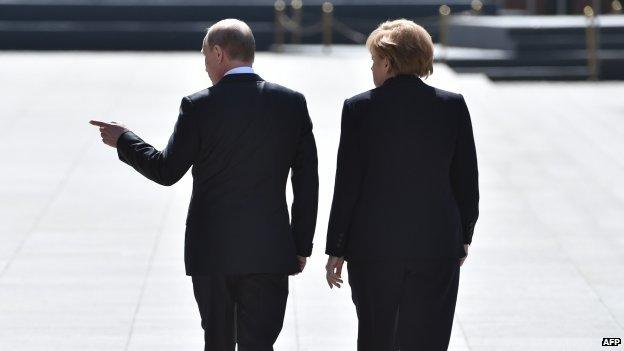
Angela Merkel is keen to keep a dialogue open with Vladimir Putin
Weakening him still further relies to a large extent on persuading his backers - Iran and Russia - to withdraw support.
A Western breakthrough in relations with Iran which would flow from any nuclear deal could be the beginning of a game-changer.
Talking President Putin into withdrawing all support for President Assad looks more farfetched.
The Western case remains that Moscow shares the same concerns over extremism running amok over vast swathes of the Middle East and North Africa.
But Russia's isolation over what Western government call land grabs in Crimea and Eastern Ukraine makes dialogue with Moscow very difficult.
Still, the key powers in the West are determined to keep lines open to the Kremlin.
Chancellor Merkel talks to Mr Putin regularly.
Last month, John Kerry flew to Sochi, external to see the Russian leader.
Next, watch for a possible re-engagement by David Cameron, perhaps a face to face meeting with Mr Putin before the end of the year.
The aim would be to try to increase dialogue despite the particularly poisoned relations between London and Moscow.
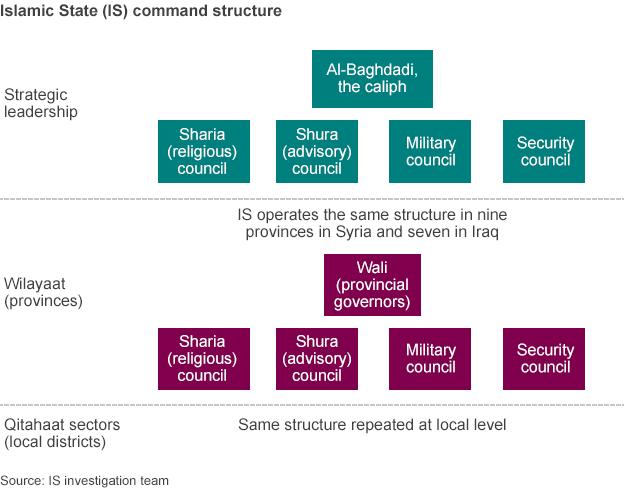
The Libya front
In Libya, the single greatest problem facing the key powers is that there is no functioning government to encourage and to bolster.
The collapse of Libya has allowed people smuggling of desperate migrants to flourish too.
This really is ungoverned space, and so far UN-led efforts to mediate and to help establish a government of national unity are way short of fulfilment.
Of course, the tide can be turned against IS eventually.
The territory it controls, or where it has substantial influence, can be fragmented, but the present political background is making that task very hard.
- Published2 June 2015
